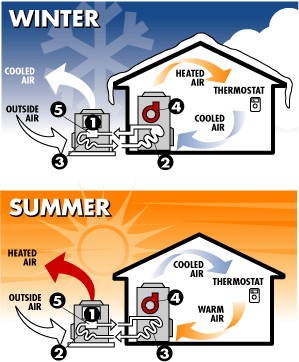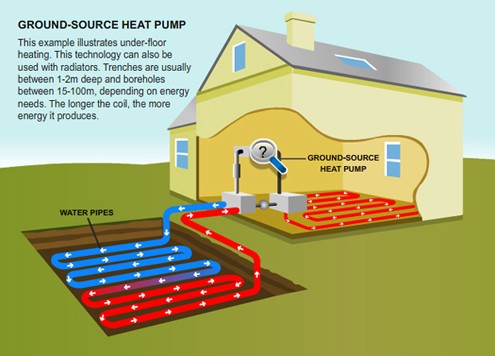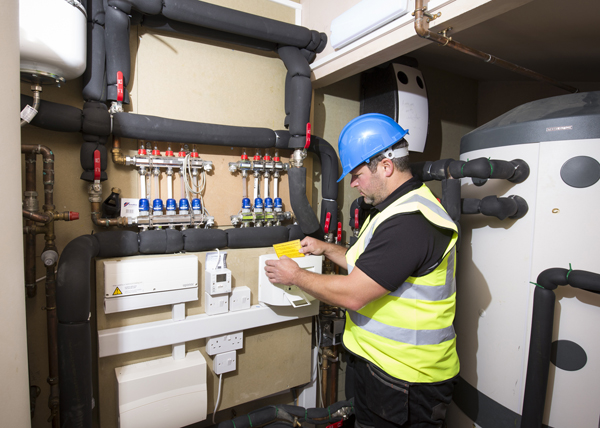HEAT PUMPS
By installing a heat pump, you could benefit from the Renewable Heat Incentive (RHI). Click here for information: http://www.rhincentive.co.uk/
Heat pumps are a fantastic way to create hot water in the home, they absorb heat from either the air or the ground.
Smart-Flo install two types – Ground Source Heat Pumps and Air Source Heat Pumps. Below is a description of how the two work.
Ground source heat pumps
Ground source heat pumps (GSHPs) use pipes which are buried in the garden to extract heat from the ground. This heat can then be used to heat radiators, underfloor or warm air heating systems and hot water in your home.
A ground source heat pump circulates a mixture of water and antifreeze around a loop of pipe, called a ground loop, which is buried in your garden. Heat from the ground is absorbed into the fluid and then passes through a heat exchanger into the heat pump. The ground stays at a fairly constant temperature under the surface, so the heat pump can be used throughout the year.
The length of the ground loop depends on the size of your home and the amount of heat you need. Longer loops can draw more heat from the ground, but need more space to be buried in. If space is limited, a vertical borehole can be drilled instead.
The benefits of ground/air source heat pumps
 • could lower your fuel bills, especially if you replace conventional electric heating
• could lower your fuel bills, especially if you replace conventional electric heating
• could provide you with income through the government’s Renewable Heat Incentive (RHI)
• could lower home carbon emissions, depending on which fuel you are replacing
no fuel deliveries needed
• can heat your home as well as your water
minimal maintenance required
Unlike gas and oil boilers, heat pumps deliver heat at lower temperatures over much longer periods. During the winter they may need to be on constantly to heat your home efficiently. You will also notice that radiators won’t feel as hot to the touch as they might do when you are using a gas or oil boiler.
Air source heat pumps are usually easier to install than ground source as they don’t need any trenches or drilling, but they are often less efficient than ground source heat pumps. Water source heat pumps can be used to provide heating in homes near to rivers, streams and lakes.
Find case studies and examples of homeowners who have installed a ground source heat pump using our Green Homes Network.
How do ground source heat pumps work?
Heat from the ground is absorbed at low temperatures into a fluid inside a loop of pipe (a ground loop) buried underground. The fluid then passes through a compressor that raises it to a higher temperature, which can then heat water for the heating and hot water circuits of the house. The cooled ground-loop fluid passes back into the ground where it absorbs further energy from the ground in a continuous process as long as heating is required.
Normally the loop is laid flat or coiled in trenches about two metres deep, but if there is not enough space in your garden you can install a vertical loop down into the ground to a depth of up to 100 metres for a typical domestic home. Heat pumps have some impact on the environment as they need electricity to run, but the heat they extract from the ground, the air, or water is constantly being renewed naturally.
 Is a ground source heat pump suitable for me?
Is a ground source heat pump suitable for me?
To tell if an air source heat pump is right for you, there are a few key questions to consider:
• Is your garden suitable for a ground loop? It doesn’t have to be particularly big, but the ground needs to be suitable for digging a trench or a borehole and accessible to digging machinery.
• Is your home well insulated? Since ground source heat pumps work best when producing heat at a lower temperature than traditional boilers, it’s essential that your home is well insulated and draught-proofed for the heating system to be effective.
• What fuel will you be replacing? The system will pay for itself much more quickly if it’s replacing an electricity or coal heating system. Heat pumps may not be the best option for homes using mains gas.
• What type of heating system will you use? Ground source heat pumps can perform better with underfloor heating systems or warm air heating than with radiator-based systems because of the lower water temperatures required.
• Is the system intended for a new development? Combining the installation with other building work can reduce the cost of installing the system.
You may also want to consider air source heat pumps, which extract heat from the outside air. Use our renewables selector to find an appropriate technology for you.
To read more about Heat Pumps visit www.energysavingtrust.org.uk
Air source heat pumps
Air source heat pumps absorb heat from the outside air. This heat can then be used to heat radiators, underfloor heating systems, or warm air convectors and hot water in your home.
An air source heat pump extracts heat from the outside air in the same way that a fridge extracts heat from its inside. It can get heat from the air even when the temperature is as low as -15° C. Heat pumps have some impact on the environment as they need electricity to run, but the heat they extract from the ground, air, or water is constantly being renewed naturally.
The benefits of air source heat pumps
- Lower fuel bills, especially if you are replacing conventional electric heating
- potential income through the UK government’s Renewable Heat Incentive (RHI)
- lower home carbon emissions, depending on which fuel you are replacing
- no fuel deliveries needed
- can heat your home as well as your water
- minimal maintenance required
- can be easier to install than a ground source heat pump.
Unlike gas and oil boilers, heat pumps deliver heat at lower temperatures over much longer periods. During the winter they may need to be on constantly to heat your home efficiently. You will also notice that radiators won’t feel as hot to the touch as they might do when you are using a gas or oil boiler.
 How do air source heat pumps work?
How do air source heat pumps work?
Heat from the air is absorbed at low temperature into a fluid. This fluid then passes through a compressor where its temperature is increased, and transfers its higher temperature heat to the heating and hot water circuits of the house. There are two main types of air source heat pump systems.
- Air-to-water
An air-to-water system distributes heat via your wet central heating system. Heat pumps work much more efficiently at a lower temperature than a standard boiler system would. This makes them more suitable for underfloor heating systems or larger radiators, which give out heat at lower temperatures over longer periods of time. - Air-to-air
An air-to-air system produces warm air which is circulated by fans to heat your home. They are unlikely to provide you with hot water as well.
Is an air source heat pump suitable for me?
To tell if an air source heat pump is right for you, there are a few key questions to consider:
- Do you have somewhere to put it? You’ll need a place outside your home where a unit can be fitted to a wall or placed on the ground. It will need plenty of space around it to get a good flow of air. A sunny wall is ideal.
- Is your home well insulated? Since air source heat pumps work best when producing heat at a lower temperature than traditional boilers, it’s essential that your home is insulated and draught-proofed well for the heating system to be effective.
- What fuel will you be replacing? The system will pay for itself much more quickly if it’s replacing an electricity or coal heating system. Heat pumps may not be the best option for homes using mains gas.
- What type of heating system will you use? Air source heat pumps can perform better with underfloor heating systems or warm air heating than with radiator-based systems because of the lower water temperatures required.
- Is the system intended for a new development? Combining the installation with other building work can reduce the cost of installing the system.
To read more about Air Source Heat Pumps visit http://www.energysavingtrust.org.uk/domestic/air-source-heat-pumps








